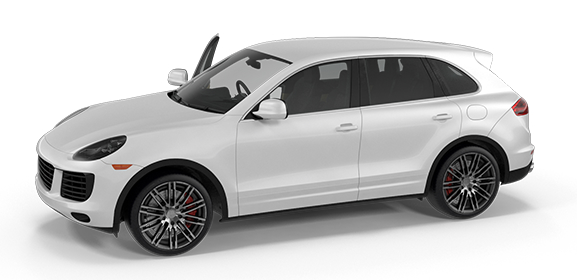INTERFIL® AIR FILTERS
INTRODUCTION
ENHANCED FUEL ECONOMY AND PERFORMANCE
- Optimal fuel burning and improved engine combustion boost your vehicle’s overall fuel economy.
- Maximized flow of clean air into the engine enhances engine performance and power.
IMPRESSIVE VALUE
- Affordable, direct-to consumer prices.
- Exceptional value without sacrificing performance
ENHANCED FUEL ECONOMY AND PERFORMANCE
- Manufactured to meet or exceed OEM (Original Equipment Manufacturer) requirements.
- OEM fitment ensures easy auto air filter installation every time.
SUPERIOR ENGINE PROTECTION & ENHANCED PERFORMANCE
Interfil® air filters are tested to the highest standard. Our testing takes into account three factors that define the performance of the air filter and thus the engine’s performance. The three factors are:
1.Efficiency is measured in percentage and is the amount of dirt/contaminants the filter blocks from entering the engine. It also takes into account initial efficiency when the filter is clean, as well as the average throughout the life of the filter. Efficiency represents the percentage of dust/contaminants that was trapped by the filter.
2.Restriction to airflow is the measure of air flow through the filter into the engine. It is measuring the differential pressure between the clean and dirty side. The lower the drop, the lower the flow of air, which could result in the filter being less restrictive.
3.Dust holding capacity measures the overall quantity (weight) of the containments captured throughout the life of the filter.
These three factors are height interdependent and impact one another. Increasing the flow could reduce the efficiency and thus the overall dust-holding capacity. Interfil® air filters are designed to maximize the flow while ensuring high efficiency, and high capacity. Resulting to cleaner and more air flowing into the engine for a longer life.
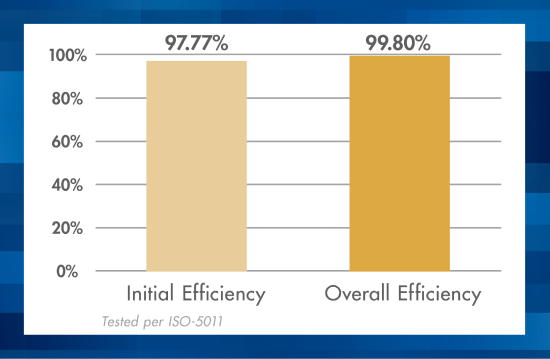
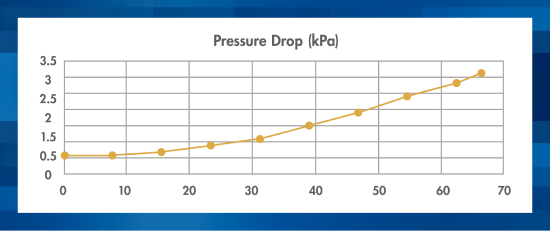
FACTORS THAT IMPACT AIR FILTER & ENGINE PERFORMANCE
Interfil® thoroughly tests three main factors that define overall filter performance:

EFFICIENCY
Efficiency is measured in percentage and represents the volume of dirt/contaminants an air filter prevents from entering an engine. Our engine air filters are designed to trap up to 98 percent* over the life of a filter.
*Tested per ISO-5011

CAPACITY
Dust-holding capacity measures the overall quantity (weight) of airborne contaminants captured throughout the life of the auto air filter. Our air filters are engineered to provide high dust-holding capacity for exceptional longevity and performance.

AIR FLOW
Restriction of airflow measures air flow through
the car filter into the engine and assesses the differential pressure between the clean and dirty side. Our automotive air filters are designed to maximize flow of clean air for enhanced power
and performance.
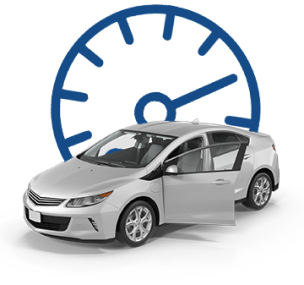
AIR FILTER REPLACEMENT
MOST CAR MANUFACTURERS RECOMMEND CHANGING THE AIR FILTER EVERY 10,000-12,000 MILES OR ONCE A YEAR, WHICHEVER COMES FIRST.
*REFER TO THE CAR MANUFACTURER’S OWNER’S MANUAL
SIGNS IT’S TIME TO REPLACE YOUR ENGINE AIR FILTER
ENGINE LIGHT COMES ON
VISUAL INSPECTION
REDUCED FUEL ECONOMY
When engines get less oxygen, they consume more fuel.
If you notice fuel economy going down, you may need to replace the air filter.
ENGINE MISFIRING
Restricted air supply can result in unburnt fuel exiting the engine as soot residue.
Soot accumulates on the spark plugs and may cause the engine to misfire.
REDUCED HORSEPOWER
Is your car not responding well or jerking when you step on the accelerator?
Replacing the engine air filter can improve acceleration or horsepower.
BLACK SMOKE OR FLAMES
Poor air supply can result in fuel that doesn’t burn completely during the combustion cycle.
Unburnt fuel exits through the exhaust pipe and may result in smoke or flames.
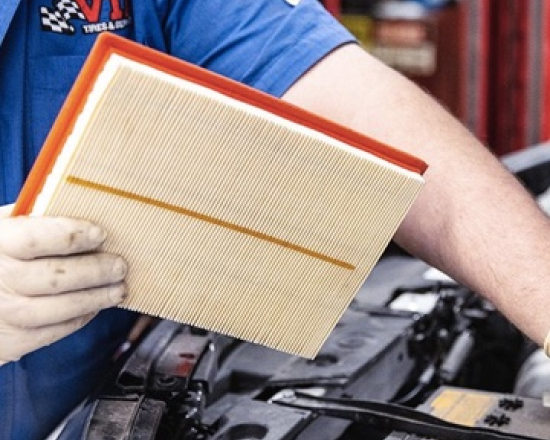
CERTAIN CONDITIONS CAN IMPACT THE LIFE OF THE AIR FILTER
POSSIBLE CAUSES OF MORE FREQUENT REPLACEMENT INCLUDE:
- Driving conditions
- Dusty roads
- Humid climates
- Congested roads and heavy-traffic areas
COVERAGE YOU CAN COUNT ON
